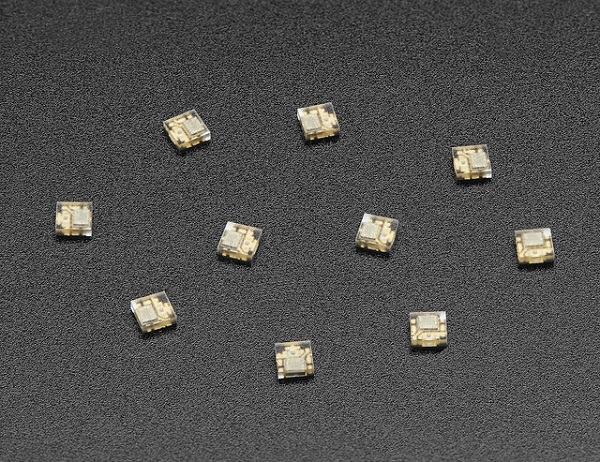Foxconn has made it public that it acquired a part of eLux’s interests through an investment of around USD 10 million given by its subsidiary CyberNet in order to develop Micro LED technology. CyberNet, on behalf of the Foxconn Technology Group, will become the biggest shareholder with a 45.45% share, aligning with the other two-Innolux (13.64%) and AOT (9.09%).
In October 2016, eLux was founded in Camas, Washington. A startup as it is, eLux actually originates from Sharp as both its CEO Jong-Jan Lee and CTO Paul Schuele were members of Sharp Laboratories of America.
San’an Opto Blazed a Trail in Micro LED Development
Early in this year, San’an responded to an investor’s question on its interactive platform saying it already started the R&D of Micro LED a couple of years ago and Micro LED would be one of the major focuses of the company.
VueReal to Mass Produce 6000ppi Micro LED Display in 2018
VueReal, a Canadian high-tech company with expertise in Micro LED technology, announced in May a 4K Micro-LED display at 6000 ppi that was considered the record highest pixel-per-inch emissive display. The Canadian company planned to complete all assessment tests by the end of 2017 and provide product demos to clients who have articulated their interest. It also planned to begin mass production of its microdisplay in 2018 to first meet the needs of niche clients and then to license its Micro LED technology to display makers.
Samsung Refuted the Claim to Acquire PlayNitride
A source once told that Samsung would procure PlayNitride, a Taiwan-based Micro LED company, for USD 150 million. Samsung was said to attempt to develop Micro LED displays for VR applications and might use PlayNitride’s technology on Micro LED TV believed to be another aim of the Korean electronics behemoth. In response of the rumor, Charles Li, CEO of PlayNitride replied, “ That was a beautiful mistake. PlayNitride does collaborate with several well-known international companies but, no, it is not sold to Samsung.”
Apple Watch Be the First to Use Micro LED Technology in 2018?
Apple opened a secret lab in Taoyuan, Taiwan early in April. The Taoyuan plant would start a small batch production of Micro LED displays for the next generation Apple Watch at the end of this year, as Taipei Times carried in its previous report. The report also pointed out that Apple would begin to mass produce Micro LED displays in 2018 and it would surely affect display makers such as Samsung and LG Display.
ITRI & Macroblock’s Joint Development on Micro LED Driver
A few months ago, Macroblock announced its collaboration with the Industrial Technology Research Institute (ITRI) to develop Micro LED display modules. Through the partnership, Macroblock hoped to speed up the development of driver ICs for Micro LED displays and to overall accelerate the introduction of Micro LEDs to ultra fine-pitch displays.
Dr. Li-chiang Yang, Chairman of Macroblock, said the current development of fine pitch LED digital display in pitch P1 or below P1 has reached its technological and budget limits. Even if some LED display manufacturers succeeded in developing such fine pitch displays, they are yet to be able to mass produce their products. Yet, that could be an opportunity for Micro LED.
Innolux Has Mini LED at One Hand and Micro LED at the Other
Innolux’s executive vice president Chin-lung Ting said the company has got both Mini LED and Micro LED under development to pioneer the next generation display technology. Innolux is likely to mass produce Mini LED displays with high flexibility and various shape options after one or two years, expressed Ting.
Ting also articulated an affirmative outlook that Micro LED will be mainstream amidst the next generation display technologies despite a few unsolved technological hurdles in processes such as mass transfer of micron-sized chips. Innolux regarded Mini LED it developed as one step closer to Micro LED technology and it would possibly take one more year for the display maker to mature its manufacturing techniques.
Micro LED Needs Advanced Semiconductor Technology: Evatec
The Swiss semiconductor equipment provider Evatec previously explained during an interview with LEDinside that current technologies are able to meet the quality requirements of traditional LED chip manufacture. Whereas, for Micro LED chip production that requires ‘zero particles’ or ‘particle-free’ deposition quality, the industry needs equipment with semiconductor technology to deal with the intricacy of the production.
The main focus of Micro LED technology; instead of high luminous efficacy, is ‘zero particles’ to achieve high production yields, suggesting those optoelectronics companies with semiconductor equipment are more likely to pioneer in the Micro LED market and secure their positions in the long run.
Evatec’s high performance CLN200 and RADIANCE both have high versatility and can be used to process the deposition of transparent conducting films (TCO), metal electrodes, and distributed Bragg reflectors (DBR) during the production of LED, as well as that of Micro LED. In addition, different from conventional ways to flip chips manually, Evatec’s equipment allows the automated cassette to cassette chip handling. To use semiconductor equipment in the manufacturing process can produce LEDs that feature ‘zero particles’ quality, improve current density during current spreading, and consume lower VF when powered.
Micro LED Be First Seen in VR and Wearables in 1-2 Years: Epistar
B.J. Lee, Chairman of Epistar, at the shareholder meeting on 21st June, said Mini LED could be considered a predecessor of Micro LED. Currently, only Osram and Epistar are able to offer RGB LEDs. Epistar was very confident at earning great business opportunities, cited Chairman Lee.
Lee also confirmed it requires 6-inch epi-wafers to produce Micro LEDs and Epistar is able to manufacture certain wafers and even make micron-sized chips out of them. In terms of application, Micro LED can be firstly used in applications such as wearable devices and VR headsets in 1-2 years; while it might take longer, assumedly 3-5 years, to see it in the market of large displays in sizes above 10 inches.












